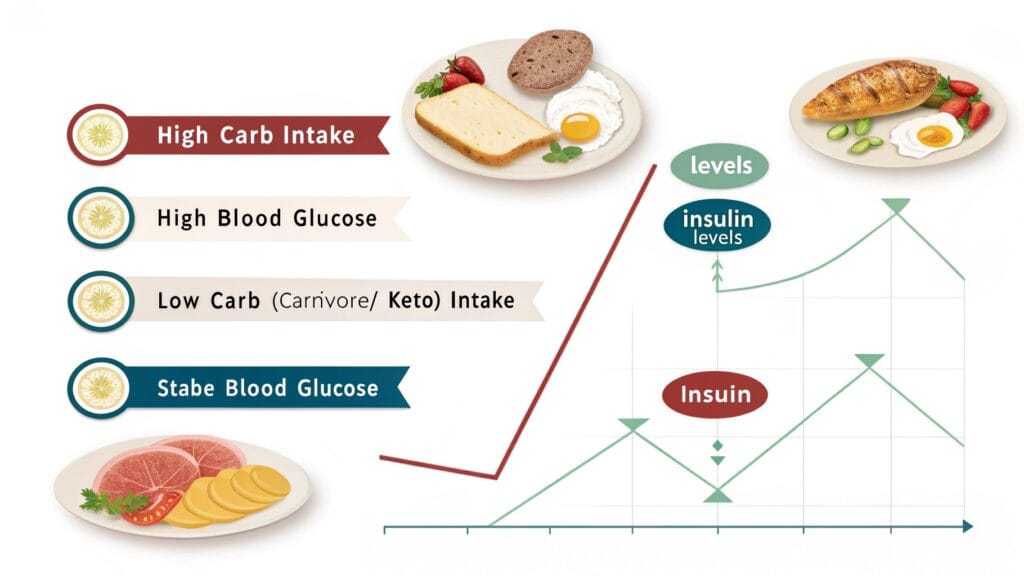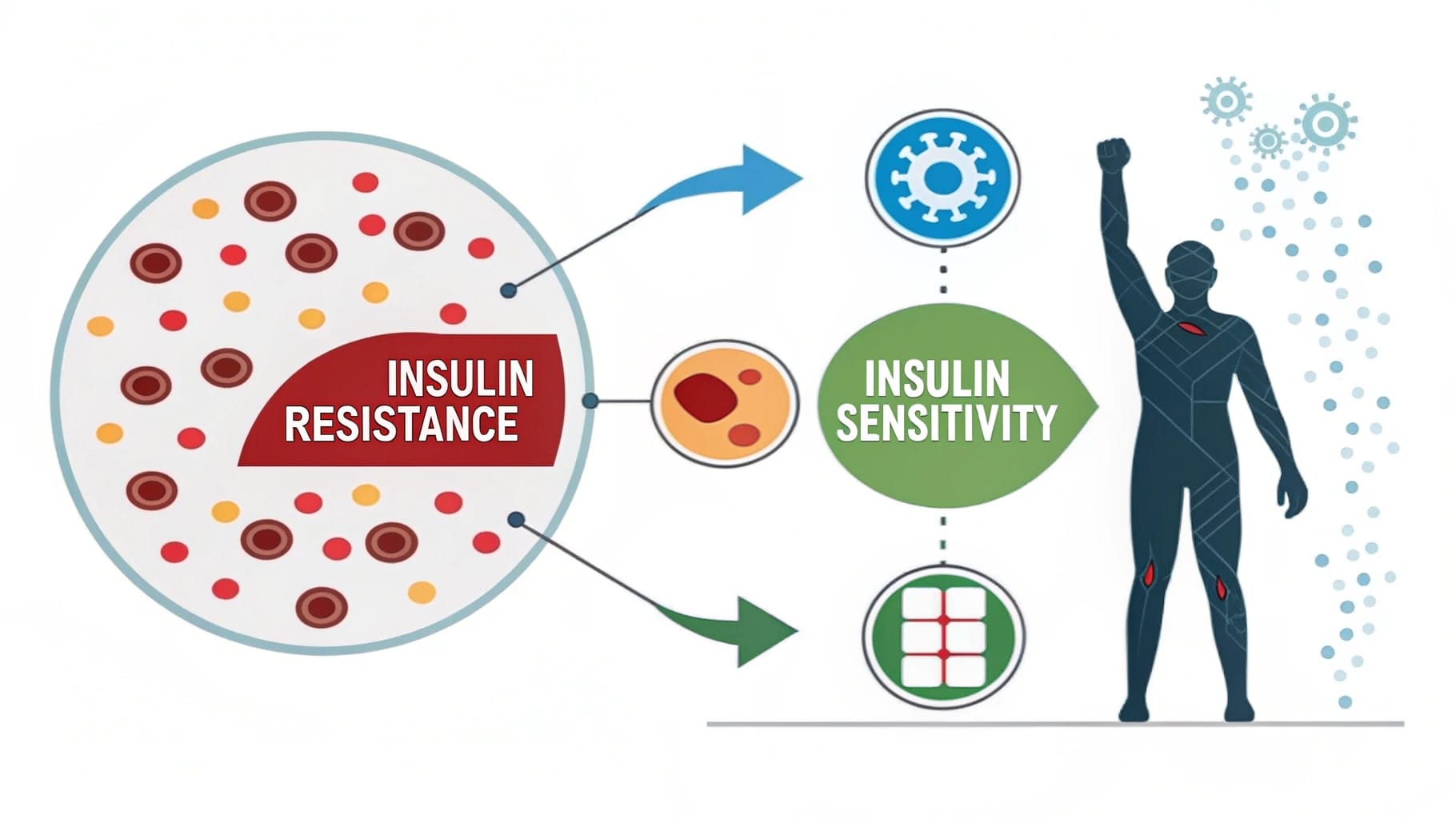Carnivore Diet & Insulin Sensitivity: how to improve insulin sensitivity
Are you struggling with insulin resistance or concerned about your metabolic health? You’re not alone. Millions of people worldwide are seeking effective solutions to this foundational health challenge that underlies many chronic conditions.
As we explored in our guide, What is Insulin Resistance Explained? Symptoms, Causes, & How Low-Carb Diet Helps Reverse It, insulin resistance occurs when your body’s cells stop responding properly to insulin signals, leading to a cascade of metabolic dysfunction that can eventually progress to serious conditions like type 2 diabetes.
But how exactly does focusing almost exclusively on animal foods or drastically cutting carbs impact something as fundamental as how your cells respond to insulin? The answer lies in understanding the science of insulin resistance itself.
In this comprehensive guide, I’ll explain the specific mechanisms by which carnivore and ketogenic diets improve insulin sensitivity, backed by scientific understanding and clinical evidence on Low-Carbohydrate Ketogenic Diets (LCKD). By the end, you’ll understand exactly why these approaches are powerful tools for addressing insulin resistance at its root.
Table of Contents
Quick Recap: The Core Problem of Insulin Resistance
Insulin resistance is fundamentally a cellular communication problem – your cells are essentially ignoring insulin’s signals, leading to elevated blood sugar and chronically high insulin levels (hyperinsulinemia). This isn’t just a blood sugar issue; it’s a systemic metabolic dysfunction underlying serious diseases from diabetes to heart disease and even certain cancers.
When your cells become resistant to insulin, your pancreas compensates by producing more insulin, creating a vicious cycle that only worsens over time. This state of chronic hyperinsulinemia becomes both a symptom and a driving factor of worsening metabolic health.
The Foundational Principle: Carbohydrate Restriction
The primary driver of insulin resistance is often chronic over-exposure to insulin signals, largely triggered by dietary carbohydrates. It’s a simple equation: Carbohydrates → Glucose → Insulin Release. The more frequent and larger your carb intake, the more insulin your body must produce, and the more often it does so.
Therefore, the most direct way to reduce the demand on your insulin system and allow sensitivity to recover is by significantly restricting dietary carbohydrates. This is precisely where the carnivore diet and ketogenic approach shine.
When you drastically reduce carbohydrate intake – to nearly zero on carnivore or under 20g on strict keto – you fundamentally alter this equation, giving your insulin system the break it desperately needs to reset and recover.

How the Carnivore & Keto Diets Address Insulin Resistance Mechanisms
The carnivore and ketogenic diets work through multiple pathways to reverse insulin resistance. Let’s explore the scientific mechanisms that make these approaches so effective.
Combating Chronic Hyperinsulinemia
The carnivore diet (near-zero carb) and ketogenic diet (<20g carb) drastically reduce glucose spikes from food. When you consume primarily animal proteins and fats with minimal to no carbohydrates, your blood glucose levels remain remarkably stable throughout the day.
Lower glucose spikes mean significantly less insulin needs to be released by your pancreas. This dramatic reduction in insulin secretion gives your body’s cells a much-needed break from constant signaling, allowing their insulin receptors to become more responsive. This directly targets what researchers call “Fast IR” – the rapid desensitization to insulin driven by hyperinsulinemia.
According to a study published in the New England Journal of Medicine, low-carbohydrate diets can significantly how to improve insulin sensitivity markers even without weight loss, highlighting how this mechanism works independently of changes in body composition.
Improving Fat Cell Health & Reducing Ectopic Fat
Lower insulin levels send a weak signal for fat storage. Insulin is your body’s primary fat-storage hormone – when levels are chronically elevated, your body continuously stores fat and resists burning it. The dramatic reduction in insulin levels experienced on carnivore and keto diets, combined with the often spontaneous calorie reduction many people experience, facilitates efficient fat burning and weight loss.
What’s particularly important is the loss of visceral fat (belly fat) and the reduction of fat stored inappropriately in organs like the liver and muscles (ectopic fat). A 2020 review in Nutrients journal found that ketogenic diets are particularly effective at reducing hepatic fat content, which is strongly linked to insulin resistance.
Removing excess fat from these tissues directly improves their ability to respond to insulin, reversing a key aspect of what researchers call “Slow IR” – insulin resistance driven by lipotoxicity and ectopic fat accumulation.
Reducing Systemic Inflammation
High-carbohydrate diets, especially those rich in refined sugars and processed seed oils, can be pro-inflammatory for many people. The carnivore diet completely eliminates these potentially inflammatory inputs, while keto drastically reduces them.
As fat cells shrink during weight loss on these diets, they also release fewer inflammatory cytokines. Fat tissue, particularly visceral fat, isn’t just an inert storage depot – it’s metabolically active and releases inflammatory compounds that can directly contribute to insulin resistance.
A 2019 study in the journal Metabolism demonstrated that ketogenic diets can reduce multiple inflammatory markers, including C-reactive protein and interleukin-6, both implicated in insulin resistance.
This reduction in systemic inflammation throughout the body means better insulin signaling and improved cellular communication. For many people with inflammatory conditions like arthritis or autoimmune disorders who also have metabolic issues, this dual benefit can be life-changing.
Targeting Ceramides
Ceramides are bioactive lipid molecules that have been identified as key players in blocking insulin signaling within cells. These molecules essentially act as roadblocks in the insulin signaling cascade.
Since high insulin levels, excess fat storage, and inflammation all contribute to ceramide buildup, a diet that reduces all three (like carnivore or keto) is likely to help reduce ceramide levels, thereby removing a key internal block to insulin signaling.
Recent research from the Mayo Clinic has identified ceramides as an important therapeutic target for metabolic syndrome and insulin resistance, lending further credence to dietary approaches that may reduce these compounds.
Clinical Evidence: What Research Shows About Low-Carb Diets and T2D/IR
The scientific theory is compelling, but what does clinical research show about these dietary approaches in practice?
A groundbreaking study (PMID: 16644701) published in Nutrition & Metabolism followed 21 participants with Type 2 diabetes who adopted a ketogenic diet (restricted to <20g carbohydrates daily) over a 16-week period. The results were remarkable:
- Participants experienced significant improvements in HbA1c (from 7.5% to 6.3% on average) and fasting glucose levels
- Meaningful weight loss (average of 6.6% of body weight)
- Improved lipid profiles (including increased HDL cholesterol)
- Significantly reduced inflammation markers
But perhaps the most compelling finding was related to medication requirements. In fact, the study found that a remarkable 81% of participants were able to reduce or completely eliminate their diabetes medications, a powerful indicator of reversed insulin resistance. Read our full breakdown of this groundbreaking study here.
This clinical evidence provides strong validation that a diet very low in carbohydrates can dramatically improve metabolic health markers associated with insulin resistance in people with Type 2 Diabetes. The results weren’t just statistically significant – they represented meaningful improvements in real people’s lives and health outcomes.
Bridging LCKD Evidence to the Carnivore Diet
While much of the formal research has been conducted on ketogenic diets rather than strict carnivore diets, the underlying mechanisms are similar and in many ways intensified on the carnivore approach.
The carnivore diet adheres to the strict carbohydrate restriction principles proven effective in LCKD studies, but takes them further by eliminating virtually all carbohydrates and potentially inflammatory plant compounds.
The mechanisms that made the LCKD effective in clinical trials – reduced insulin secretion, improved fat metabolism, decreased inflammation, and potentially reduced ceramide levels – are central to the carnivore approach as well. This alignment explains the growing number of anecdotal reports and case studies of profound metabolic health improvements among carnivore diet adherents.
Dr. Shawn Baker, an orthopedic surgeon and advocate for the carnivore diet, has collected thousands of testimonials from people reporting improvements in insulin sensitivity and reversal of type 2 diabetes after adopting a carnivore approach.
For those who may have inflammatory responses to certain plant compounds, the carnivore diet might offer additional benefits beyond standard keto by eliminating these potential irritants, which could contribute to improved insulin signaling through reduced inflammation.
What This Means For Your Insulin Sensitivity
Adopting a carnivore or strict ketogenic approach for insulin resistance could potentially offer several meaningful benefits:
- Improved cellular response to insulin
- Lower fasting insulin and HOMA-IR scores (key markers for insulin resistance)
- Stabilized blood sugar levels with fewer spikes and crashes
- Reduced need for insulin or other blood-sugar-lowering medications
- Reduction or resolution of common insulin resistance symptoms like fatigue, brain fog, and constant hunger
- Lower risk of progressing to Type 2 diabetes or improvement in existing T2D
These benefits don’t typically happen overnight but often begin within weeks of strict adherence to the diet. Many people report noticeable improvements in energy, mental clarity, and hunger signals within the first month, while measurable changes in laboratory markers may take 2-3 months to fully manifest.
If you’re currently practicing intermittent fasting alongside your carnivore or keto approach, you may experience even more pronounced benefits, as fasting has been shown to further enhance insulin sensitivity through complementary mechanisms.

Monitoring Your Progress
As you embark on a carnivore or keto journey to improve insulin sensitivity, tracking your progress becomes important for motivation and fine-tuning your approach.
Beyond standard blood sugar testing, consider asking your healthcare provider for more comprehensive insulin resistance testing, including fasting insulin levels and HOMA-IR calculations, as discussed in our testing guide.
Many people also find that tracking symptoms like energy levels, hunger patterns, and mental clarity can provide valuable feedback about improving insulin sensitivity, even between formal lab tests.
Important: Always Consult Your Doctor
MEDICAL DISCLAIMER: This article is provided for educational and informational purposes only and is not intended as medical advice. If you have diabetes, insulin resistance, or any metabolic condition, it is crucial that you work with your healthcare provider before making significant dietary changes.
This is especially important if you’re currently taking medications for blood sugar management. As insulin sensitivity improves, medication dosages often need adjustment to prevent hypoglycemia (dangerously low blood sugar). Never adjust or discontinue medications without proper medical supervision.
Conclusion: A Powerful Dietary Tool
The science is clear: carnivore and ketogenic diets effectively target the root causes and mechanisms of insulin resistance by significantly reducing carbohydrate intake, lowering insulin levels, improving fat metabolism, and reducing inflammation.
This scientific understanding is supported by both clinical evidence on low-carb ketogenic diets and growing anecdotal reports from the carnivore community. While more research specifically on the carnivore diet is needed, the fundamental principles that make it effective for insulin sensitivity are well-established.
By addressing insulin resistance at its core rather than simply managing symptoms, these dietary approaches offer a powerful tool for reclaiming metabolic health and potentially preventing or reversing conditions like type 2 diabetes.
Whether you choose to explore a full carnivore diet approach or begin with a more moderate ketogenic diet, the evidence suggests you’re taking a scientifically sound path toward improved insulin sensitivity and better overall health.
Ready to Take Action?
- Need a refresher on what Insulin Resistance is? Read our full guide here.
- See the powerful study results where a low-carb diet helped 81% reduce diabetes medication.
- Ready to explore the Carnivore diet? Start with our Food List and Recipe Collection.
- Concerned about transitioning to a low-carb diet? Learn about managing keto flu symptoms.
- Wondering about intermittent fasting with carnivore or keto? We have you covered.
Have you experienced improvements in insulin sensitivity or diabetes management through a carnivore or keto approach? Share your experiences in the comments below – your story could inspire others on their health journey!
External Resources:
- American Diabetes Association: Standards of Care in Diabetes
- Virta Health Research on Ketogenic Diet and Type 2 Diabetes
- National Institutes of Health: Understanding Insulin Resistance
Enjoy, Review – We Value Your Opinion!
There are no reviews yet. Be the first one to write one.

